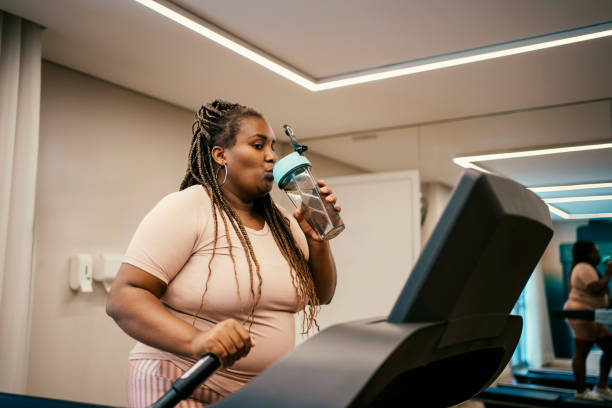(BlackFitness101.com) Losing weight as you age can feel like battling an uphill slope. Metabolic rates decline, life gets busier, and the body doesn’t quite respond as it did in your 20s. However, with the right strategies, shedding those extra pounds isn’t just a possibility; it can be a realistic goal. Here are the top five ways to lose weight as you get older, encompassing dietary adjustments, exercise plans, lifestyle changes, and more.

1. Understanding and Adjusting Your Diet
As we age, our bodies require fewer calories due to a natural decline in muscle mass and metabolic rate. It becomes crucial to understand and adjust your diet to align with these changes. Focus on nutrient-dense foods that provide the vitamins and minerals your body needs without excess calories.
a. Increase Protein Intake
Incorporating more protein into your diet can help maintain muscle mass, which is key to keeping your metabolism active. Consider lean meats, fish, legumes, and dairy products. A protein-rich diet can also make you feel fuller for longer, reducing the temptation to snack on unhealthy options.
b. Fiber is Your Friend
High-fiber foods, such as fruits, vegetables, and whole grains, can aid in digestion and help you feel full. This natural appetite suppressant is especially beneficial for older adults looking to reduce their calorie intake without feeling starved.
c. Hydration
Often overlooked, staying hydrated is essential for weight loss at any age. Water aids in digestion and metabolism and can help curb hunger. Sometimes thirst is mistaken for hunger, so keeping a bottle of water handy could prevent unnecessary snacking.
2. Tailoring Your Exercise Routine
Exercise is a cornerstone of weight loss and becomes increasingly important as you get older. However, the focus should shift from high-intensity workouts to a balanced routine that includes cardiovascular exercises, strength training, and flexibility practices.
a. Cardiovascular Health
Activities like walking, cycling, and swimming are excellent for burning calories and improving heart health. Aim for at least 150 minutes of moderate aerobic activity or 75 minutes of vigorous activity each week, as recommended by health authorities.
b. Strength Training
Muscle mass naturally declines with age, but strength training can help reverse this trend. Incorporating weights or resistance bands into your routine at least twice a week can boost your metabolism and support weight loss.
c. Flexibility and Balance
Yoga and Pilates can improve flexibility, core strength, and balance, reducing the risk of falls and injuries. These practices also promote mindfulness, which can help with emotional eating.
3. Lifestyle Modifications
Lifestyle modifications can significantly impact your ability to lose weight as you age. This encompasses sleep, stress management, and social activities.
a. Prioritize Sleep
Quality sleep is vital for weight loss at any age. Lack of sleep can disrupt hormones that regulate hunger, leading to increased appetite and weight gain. Aim for 7-9 hours of sleep per night.
b. Manage Stress
Chronic stress can lead to overeating and weight gain. Techniques such as meditation, deep breathing, and spending time in nature can reduce stress levels and support weight loss efforts.
c. Social Support
Joining a group or finding a weight loss buddy can provide motivation and accountability. Sharing your goals with others can make the journey more enjoyable and less daunting.
4. Monitoring Progress and Adjusting Goals
Weight loss is a journey, and it’s important to monitor your progress. Use a journal or an app to track your food intake, exercise, and weight changes. Celebrate small victories to stay motivated.
a. Be Realistic
Set achievable goals that reflect your body’s changes. Losing 1-2 pounds per week is a healthy and sustainable rate.
b. Adjust as Necessary
If you hit a plateau, reassess your diet and exercise plan. Sometimes, minor adjustments can reignite weight loss.
5. Medical Consultation
Before making significant changes to your diet or exercise routine, consult with a healthcare provider. They can offer personalized advice based on your health history and goals. Additionally, they can check for any underlying conditions that may affect your ability to lose weight.
a. Medication Review
Some medications can contribute to weight gain. Your doctor can review your medications and suggest alternatives if necessary.
b. Health Screenings
Regular health screenings can identify issues like thyroid disorders or hormonal imbalances that may impact weight loss.
In conclusion, losing weight as you get older requires a comprehensive approach that includes dietary adjustments, tailored exercise, lifestyle modifications, goal monitoring, and medical consultation. By adopting these strategies, you can overcome the challenges of aging and achieve a healthier, more vibrant life. Remember, the journey to weight loss is personal and requires patience and perseverance. Celebrate your progress, adjust your strategies as needed, and always prioritize your health and well-being.
Staff Writer; Leroy Smith
Questions? Feel free to email me at; LSmith@BlackFitness101.com.












Leave a Reply